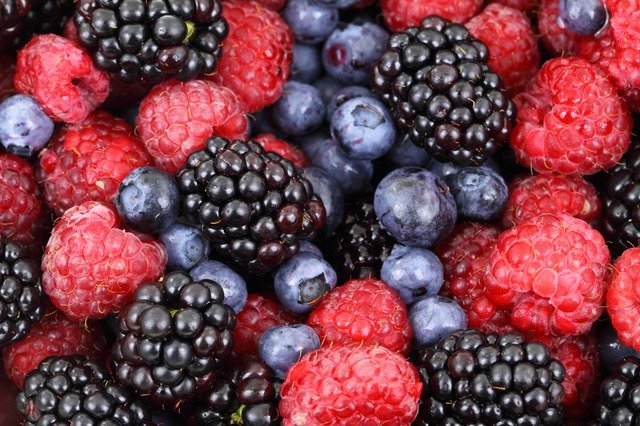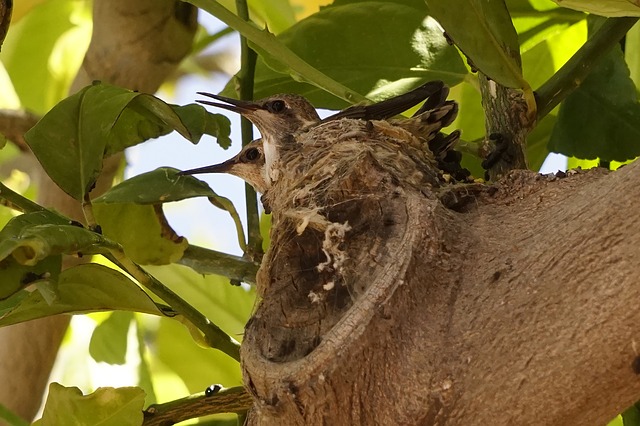Fledglings need to eat in order to get in tip top shape so, once their mother has taught them the basics of survival, they can finally explore the expanse of their local region and eventually multiple countries when migration season comes by.
Baby hummingbirds can eat a variety of foods with the most common delicacies eaten by the baby being regurgitated small insects like spiders, fruit flies, gnaps etc, nectar from bloomed flowers or sugar water mixture if you happened to find a orphan hummer in need of your help.
It is important to note that baby hummers couldn’t survive on a pure nectar diet which is why regurgitated insects is the most important meal for newly hatched hummingbirds if they want to grow strong and become independent.
How Do Hummingbirds Feed Their Chicks?
They feed their babies by first consuming the insects, nectar etcetera before regurgitating the contents, directly feeding the regurgitated food into the chicks beaks.
I know, it’s kinda gross but this is quite normal for all birds including hummers. This feeding process continues on for 3-4 weeks until the chicks are older, stronger and have enough practice flying so that they can finally go nectar and insect hunting with their mother.
What Insects Do Baby Hummingbirds Eat?

Hummingbirds tend to gather a variety of small insects ranging from spiders, mosquitoes, gnats, fruit flies, ants, aphids and mites to feed their chicks.
These as mentioned are mushed up together and regurgitated into the babies mouths so they can take in the necessary nutrients, in particular protein, to grow, unlike their fully grown mother who is more than capable of surviving purely on a flower nectar diet.
With that being said nectar is also fed to the babies but, the densely nutritious bugs are still the more essential food for the chicks growth. Research has shown that insects are more or less equivalent in nutrition to other meats such as beef, chicken lamb so it makes a good bit of sense that hummingbirds love feasting on them.
Infact it makes up on average 80% of the typical hummingbirds diet therefore, it’s no surprise that it’s an essential food source for a baby hummers growth.
Can Baby Hummingbirds Eat Fruits?

Hummingbirds are attracted to the juices of certain fruits, whether it be a pear, peach’s, berries or oranges. That’s why if rippened fruits like thes are easily accessible to a mother hummingbird and they wish to offer some to their kin, their offspring can technically consume fruits however, in most cases due to the lack of availabity most hummingbirds are unlikely to be feed their babies the juicies from fruits.
Sugar water is something that orphaned hummingbird can feed on which acts as a substitute to nectar. Tree sap is another unqiue food source of surcrose that a mother hummer may feed their babies although, in this case hummingbirds prefer nectar so tree sap isn’t their first choice if the other more desireable foods are present.
How Often Do Baby Hummingbirds Eat?
Baby Hummingbirds need to be fed every 20 – 30 minutes, right from dawn all the way till dusk. That means the mother has to constantly be searching for new food multiple times an hour if the supply is out. This isn’t completly different from their normal lifestyle as hummers tend to consume a ton of food in general but, now they can only do so within their nests range limiting the oppurtunity to gather as much.
Also, when the babies are a sleep otherwise known as the tropor state where energy consumption is minimisd by 85 percent, the food consumption rate for baby hummingbirds won’t be anywhere near as high.
It’s definitely a hands on job for the mother but, it’s not an extremly long time relatively speaking as baby chicks become independent hummingbirds within 3 – 4 weeks in most cases.
How Long Can A Hummingbird Chick Survive Without Eating?
Most baby birds can survive on the nutrients within the embryo of the their egg however, baby chicks cannot survive a day without food. Considering how often these little featherballs need to be fed per hour, going 24 hours without any nutrients does mean that the fledgling will most likely die.
Bigger predator birds can last a day or 2 more without food but, a hummingbird chick can’t do it. if you ever find one that hasn’t been fed and you don’t want it to pass away, it would definetly be in the little chicks best interets if you feed it immediately.
Summary
Feeding baby hummers is a very taxing job for the mother which I guess you could say is generally the case for most other animal/ bird mothers however, having to only stay with their fledlings for a short couple months till the babies are independent it’s a samll price to pay for the hummingbird mother.
The food they eat isn’t necessarily hard to find as insects are everywhere but, having to feed these featherballs up to 3 times an hour whilst managing thier own food intake for 3 – 4 weeks, does make the whole process, at least in the presepective of human, a very taxing experience.
Of course this is just how hummingbirds nurture their offspring, that I have to admit is truly an admirable job consideiring once they’re independent the mother hummingbird is unlikely to see their offspring again.
References
https://www.medicalnewstoday.com/articles/311139#Eating-bugs-could-combat-obesity
https://www.birdwatchersdigest.com/bwdsite/learn/hummingbirds/what-do-hummingbirds-eat.php
https://www.thespruce.com/what-do-hummingbirds-eat-386568
Amhil Khan, a dedicated nature enthusiast and the founder of BirdsOfTheWild.com, is a passionate advocate for the captivating world of avian wonders. With a deep-seated curiosity about the intricate lives of birds, Amhil’s journey began as a fascination and has evolved into a mission to inspire others to appreciate and protect these magnificent creatures.
Amhil’s love for birds led to the creation of Birds of the Wild, a platform where his expertise in ornithology, coupled with his captivating storytelling, provides readers with an immersive and educational experience. Through his lens and words, he captures the essence of birds in their natural habitats, offering a glimpse into their behaviors, migrations, and the ecosystems they inhabit.

